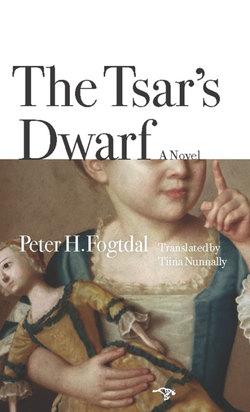Читать книгу The Tsar's Dwarf - Peter H. Fogtdal - Страница 12
На сайте Литреса книга снята с продажи.
5.
ОглавлениеI’M BEING ESCORTED THROUGH THE NARROW, CLAUSTROPHOBIC passages inside Copenhagen Castle, up and down stairs that put a strain on my deformed limbs. The passages are lit by meager wax candles that go out at the slightest provocation. The candles have been stuck in holders along discolored walls. Here only servants are admitted. No member of the royal court would dream of frequenting this desolate part of the castle, where the inhabitants are sweaty and where knives sit loosely in the sleeves of toadies and flunkies.
We pass footmen, master cooks, carpenters, and chamberlains—all of them with faces rigid with importance. Most of the court puppets cast sidelong glances at me and smirk. Afterward they rush onward with their tankards, documents, and ivory trays.
The footman accompanying me is the same one as before. His face has a chronic stupor to it; a paltry little wig sits askew on his head. He opens the door to a chamber, and to my surprise I see an enormous cake, the biggest one I’ve ever seen in my life. The cake is shaped like a big church with red spires and golden cupolas in the form of onions. It’s decorated with candied fruits, marzipan, and icing, but it doesn’t look like the churches here at home. In front, in an elaborate courtyard, rest snowbanks made of whipped cream and macaroons. Little marzipan soldiers are lined up next to opulent sleighs.
The door shuts behind me, but I hardly hear it. I keep staring at the huge monstrosity of a cake. It’s not yet finished, but the monster is taller than I am. Looking closer, I see that it has been adorned with all the details: gables, archways, and gilding. Even the doors look real, down to the last door handle, hinge, and doorframe.
At that moment Callenberg appears with some of the courtiers. They offer no greeting, just look me over with an expression of curiosity. I put my hands on my hips and stare them down, like the milksops they are.
“Put the dwarf inside the cake,” says Callenberg.
Before I manage to say a single word, a servant lifts me up. I try to scratch his face, but the servant is too strong. He laughs and drops me into a big hole. I land on my feet and can just barely see over the edge.
The men laugh like idiots. I stare back at them and try to climb out of the hole, but the servant pushes me back inside.
“Careful!” says the pastry chef. He’s a thin man with a battlefield of warts on his face. The cake smells like glue, and I wonder how much is decoration and how much is actually edible.
“Tell the dwarf to crawl down inside the cake.”
The footman turns to me and repeats the command, but I don’t care for his tone of voice. At that instant Callenberg nods. The footman shoves my head down. I try to resist, but it’s pointless.
Now the hole is covered with a lid. The world disappears, and I find myself in the heart of the world’s most ridiculous cake, inside a hole big enough to hold only a dwarf. I gasp for breath and pound on the cake. There’s no air. I feel nauseated. I’m going to die. And as if that weren’t bad enough, I’m going to die inside a cake!
In a sense it would be appropriate to be buried under candied fruits, to be weighted down by God’s marzipan-infested hand. My life is worth nothing. I’m a parrot without plumage. No one will remember me the day after I’m dead. At most they’ll remember my body. They’ll remember my height, my back, and the ape-like appearance of my hands. But they won’t remember me.
Because there is no me. I am my body—I have no soul. There is no place for me in God’s kingdom. But there is a place for me in the void. In the void I’m allowed to take my place.
“Can it breathe?”
“Jump up!” a second voice commands.
I crouch down as I wait for the moment when there will be nothing more to wait for. Then the lid is torn off. The world is back—the world and the Lord Steward.
Slowly I stand up. My body is still asleep. It feels good to breathe the air again; it’s something to which I’ve grown accustomed. I peer over the edge of the cake. To my surprise more courtiers have arrived and more footmen. Some of them are snickering loudly, others are staring arrogantly, as if confronting a phenomenon of nature that they cannot comprehend.
“Get up on the roof, poppet.”
I gape at the Lord Steward.
“Crawl up between the towers. Do you hear me?”
I sigh. I’m just about to explain to him that not even a dwarf can fly, that I can only get up there if he brings me a stairway, but I decide not to say a word. I just look at the Lord Steward, at his fat body and double chins that quiver with every consonant he speaks. And suddenly I know that something has gone wrong. I’m important to the Lord Steward. I’m his last hope.
The royal house has use for a dwarf.
The royal house has use for me.
I cast another glance at the high-born people. Utter silence. But the silence of the fine folk is always too good to be true.
“ We’ll have to make a staircase,” sighs the pastry chef.
A moment later a footman lifts me up and carries me down to the cellar. On the way he makes sure that I hit my head against the doorframe. When he tosses me into a cell, I’m no longer conscious.
